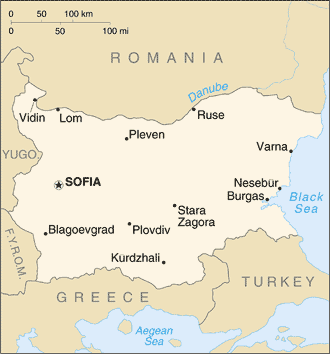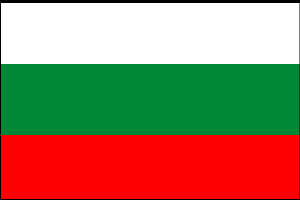
|
Bulgaria
Background:
The Bulgars, a Central Asian Turkic tribe, merged with the local Slavic
inhabitants in the late 7th century to form the first Bulgarian state. In
succeeding centuries, Bulgaria struggled with the Byzantine Empire to assert
its place in the Balkans, but by the end of the 14th century the country was
overrun by the Ottoman Turks. Bulgaria regained its independence in 1878, but
having fought on the losing side in both World Wars, it fell within the Soviet
sphere of influence and became a People's Republic in 1946. Communist
domination ended in 1990, when Bulgaria held its first multiparty election
since World War II and began the contentious process of moving toward political
democracy and a market economy while combating inflation, unemployment,
corruption, and crime.
Location:
Southeastern Europe, bordering the Black Sea, between Romania and
Turkey
Area: Total: 110,910 sq km, water: 360 sq km, land: 110,550 sq km.
Area - comparative: Slightly larger than Tennessee.
Land boundaries: Total: 1,808 km, border countries: Greece 494 km, The Former
Yugoslav Republic of Macedonia 148 km, Romania 608 km, Yugoslavia 318 km,
Turkey 240 km.
Coastline: 354 km.
Climate and Terrain:
Climate: Temperate; cold, damp winters; hot, dry summers.
Terrain: Mostly mountains with lowlands in north and southeast.
Elevation extremes: Lowest point: Black Sea 0 m, highest point: Musala 2,925
m.
Natural resources: Bauxite, copper, lead, zinc, coal, timber, arable land
People:
Population: 7,621,337.
Ethnic groups: Bulgarian 83.6%, Turk 9.5%, Roma 4.6%, other 2.3% (including
Macedonian, Armenian, Tatar, Circassian).
Religions: Bulgarian Orthodox 83.8%, Muslim 12.1%, Roman Catholic 1.7%, Jewish
0.8%, Protestant, Gregorian-Armenian, and other 1.6%.
Languages: Bulgarian, secondary languages closely correspond to ethnic
breakdown.
Government:
Government type: Parliamentary democracy.
Capital: Sofia.
Independence: 3 March 1878 (from Ottoman Empire).
Economy overview:
Bulgaria, a former communist country striving to enter the European Union, has
experienced macroeconomic stability and positive growth rates since a major
economic downturn in 1996 led to the fall of the then socialist government. The
current government, elected in 2001, has pledged to maintain the fundamental
economic policy objectives of its predecessor, i.e., retaining the Currency
Board, practicing sound financial policies, accelerating privatization, and
pursuing structural reforms.
GDP - composition by sector: agriculture: 14.5% industry: 27.8% services:
57.7%.
Statistics:
Telephones - main lines in use: 3,186,731.
Telephones - mobile cellular: 1.054 million.
Radio broadcast stations: AM 31, FM 63.
Radios: 4.51 million.
Television broadcast stations: 39.
Televisions: 3.31 million.
Internet users: 585,000.
Railways: total: 4,294 km.
Highways: Total: 37,288 km, paved: 33,786 km, unpaved: 3,502 km.
Airports: 215. - with paved runways: 129, with unpaved runways: 86.
m: 10 under 914 m: 74.
Return to Visiting Locations
|

